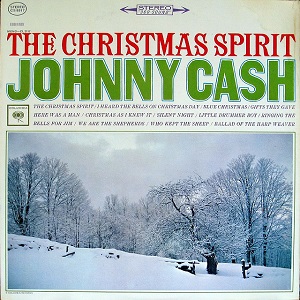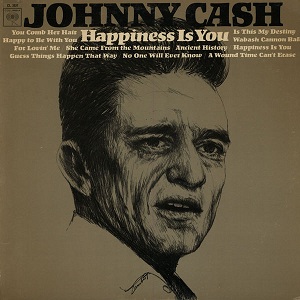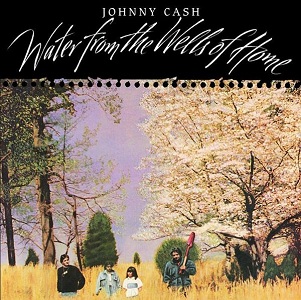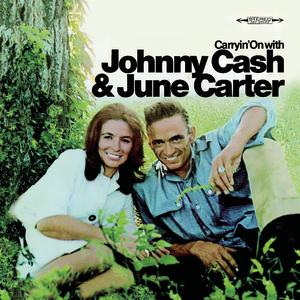
Look at Them Beans is the 52nd album by country singer Johnny Cash, released in 1975 on Columbia Records. Following an unsuccessful attempt with the previous album, John R. Cash to update Cash's sound with a new set of session musicians, Look at Them Beans reinstated The Tennessee Three as Cash's core session group.

Everybody Loves a Nut is the 23rd album by American country singer Johnny Cash, released by Columbia Records in the United States in 1966. The album consists largely of humorous novelty songs. The album's cover art was created by Jack Davis.

Ring of Fire: The Best of Johnny Cash is the sixteenth album by singer-songwriter Johnny Cash, released on Columbia Records in 1963. This album collects tracks from singles and an EP released between 1959 and 1963, Cash's first years on the Columbia label, and marked the first release of these tracks in LP format, with the exception of "I Still Miss Someone," which had previously appeared on the 1958 album The Fabulous Johnny Cash. "Ring of Fire", one of Cash's most famous tracks, made its first LP appearance here. Ring of Fire was the first #1 album when Billboard debuted their Country Album Chart on January 11, 1964. Certified Gold on February 11, 1965 by the RIAA, it earned him his first Gold LP. It stands as the only Columbia "greatest hits" collection to be included in the Johnny Cash: The Complete Columbia Album Collection box set.

The Christmas Spirit is the first Christmas album and seventeenth album by country singer Johnny Cash, released on Columbia Records in November 1963. It contains four original Christmas songs written by Cash and eight tracks originally penned by other artists, including "Blue Christmas", "Silent Night" and "Little Drummer Boy".

I Walk the Line is the nineteenth studio album by singer and songwriter Johnny Cash, featuring a handful of recent songs alongside new recordings of previous hits throughout his career up to that point. It was released on Columbia Records in 1964. The album was certified Gold by the RIAA in 1967.

Bitter Tears: Ballads of the American Indian is a 1964 concept album, the twentieth album released by singer Johnny Cash on Columbia Records. It is one of several Americana records by Cash. This one focuses on the history of Native Americans in the United States and their problems. Cash believed that his ancestry included Cherokee, which partly inspired his work on this recording. The songs in this album address the harsh and unfair treatment of the indigenous peoples of North America by Europeans in the United States. Two deal with 20th-century issues affecting the Seneca and Pima peoples. It was considered controversial and rejected by some radio stations and fans.

Orange Blossom Special is the 21st album released by musician Johnny Cash on Columbia Records in 1965. The recordings include country and folk standards, such as "The Long Black Veil", "When It's Springtime in Alaska", "Danny Boy" and "Wildwood Flower".

Happiness Is You is the 24th album by country singer Johnny Cash, released on Columbia Records in 1966. It contains, among others, "Guess Things Happen That Way", a re-recording of one of Cash's earliest Sun songs. The record reached #10 on the Country charts. The LP was originally to be titled "That's What You Get For Lovin' Me", taking its title from the Gordon Lightfoot tune included in the album, and promo copies and some early commercial pressings show this title on the label.

Hello, I'm Johnny Cash is the 33rd album by American country singer Johnny Cash, released on Columbia Records in 1970. "If I Were a Carpenter", a famous duet with Cash's wife, June Carter Cash, earned the couple a Grammy Award for Best Country Performance by a Duo or Group with Vocal in 1971 ; the song also reached #2 on the Country charts. This album also includes "To Beat the Devil", the first Kris Kristofferson song covered by Cash; the two would later collaborate numerous times, most famously on "Sunday Mornin' Comin' Down". "See Ruby Fall" and "Blistered" were also released as singles, and the album itself reached #1 on the country charts and No. 6 on the pop charts. It was certified Gold on January 29, 1970 the RIAA. The album has been released on CD and it has been made available on official download sites. This album is not to be confused with a 1977 Columbia Special Products compilation LP with the same name.

The Johnny Cash Show is the 35th overall album and third live album by American country singer Johnny Cash, recorded at the Grand Ole Opry House and released on Columbia Records in 1970 as a tie-in with Cash's then-current TV series of the same title. Though one of Cash's lesser-known live records, it spawned the highly successful single "Sunday Mornin' Comin' Down", which helped kickstart the career of singer-songwriter Kris Kristofferson. The song and album reached #1 on the Country charts. It was also his final chart entry in Australia, going no higher than #35. The album was certified Gold on February 16, 1995, by the RIAA.

Man in Black is the 38th overall album by country singer Johnny Cash, released on Columbia Records in 1971. Many of the songs on the album contain political references, either broad or specific, while the title song refers both to Cash's tendency to wear black at live shows and to the tumultuous times in which the song was created, implying the Vietnam War. The album's name also eventually became Cash's informal nickname, given to him by the public. Two tracks — "Man in Black" and "Singin' in Vietnam Talkin' Blues" — were released as singles, the former peaking at No. 3 on the Country chart. The first track features Billy Graham.

The Holy Land is a concept album, the third gospel album and 30th overall album by country singer Johnny Cash, released on Columbia Records in 1969. He recorded the album inspired by a visit to Israel with his wife, June Carter Cash and in fact most of the album consists of on-site recordings made by Cash using a portable tape recorder during a visit describing what he sees as he visits holy sites in and around Jerusalem. The remainder of the album consists of gospel songs. All but three of the songs were written by Cash, though the sole single, "Daddy Sang Bass", which reached No. 1 on the Country charts and remained that spot for six weeks, was penned by Carl Perkins.

The Mystery of Life is the 77th album by country singer Johnny Cash, released in 1991, and his last for Mercury Records. The songs featured are culled from both recent sessions and from leftovers from Cash's first Mercury session in 1986 for the album Johnny Cash is Coming to Town.

Johnny Cash Is Coming to Town is the 73rd album by American country singer Johnny Cash, released in 1987, and his first for Mercury Records. It was re-released in 2003, paired with Boom Chicka Boom on a single CD. "Sixteen Tons" was previously a hit for Tennessee Ernie Ford, "The Big Light" is an Elvis Costello song from his album King of America, released the previous year and "Let Him Roll" is from Guy Clark's debut, Old No. 1. The album reached #36 on the country charts, while the only released single, "The Night Hank Williams Came to Town", peaked at #43.

The Last Gunfighter Ballad is the 55th album by American country singer Johnny Cash, released on Columbia Records in 1977. Highlights include the title track, "Far Side Banks of Jordan" and "That Silver Haired Daddy of Mine", the latter of which features Cash's brother Tommy Cash. The title track was the album's only single, reaching #38 on the country charts; it tells the tale of an aging gunslinger who finds himself unable to deal with the modern way of life.

Strawberry Cake is a live album and 53rd overall album by American singer Johnny Cash, released on Columbia Records in 1976. The album includes numerous pieces of between-song stage banter. The album includes several of Cash's most well-known early songs, such as "Big River", "I Still Miss Someone" and "Rock Island Line", as well as a number of more obscure compositions, some of which were performed by Cash for the first time; this includes "Strawberry Cake" and "Navajo". The title track was released as a single, but did poorly on the charts, peaking at No. 54.

The Junkie and the Juicehead Minus Me is the 48th album by country singer Johnny Cash, released in 1974 on Columbia Records. Although credited to Cash alone, the album includes solo performances by his biological daughter Rosanne Cash, and stepdaughters Rosie Nix Adams and Carlene Carter, predating the launch of their own solo careers. Two songs on the album were written by Kris Kristofferson, while "Don't Take Your Guns to Town" is a re-recording of a highly successful Cash single, his first smash hit for Columbia from back in 1958. "Father and Daughter " is a cover version of a well-known Cat Stevens song and a duet with Cash's stepdaughter, Rosie Nix Adams, with slight changes in lyrics; a version of the same song would be released in 2003 on Unearthed, as a duet with Fiona Apple. June Carter Cash also performs a solo track without her husband, one of only a couple of occasions where she did this on a Johnny Cash album outside of concert recordings.

Water from the Wells of Home is the 75th album by American country singer Johnny Cash, released on Mercury Records in 1988. It features several collaborations with other artists, including "New Moon Over Jamaica" with Paul McCartney. Other guests include Waylon Jennings, Hank Williams Jr., Glen Campbell, Emmylou Harris and family members Rosanne Cash, John Carter Cash, June Carter Cash and members of the Carter Family. "Call Me the Breeze" is a J. J. Cale song that had been previously performed by Lynyrd Skynyrd. "Ballad of a Teenage Queen" is a new recording of a song that had appeared on Cash's Sun era album Sings the Songs That Made Him Famous. The album did not fare well on the charts, peaking at No. 48; the two singles, "Ballad of a Teenage Queen" and "That Old Wheel", reached No. 45 and No. 21, respectively. A 2003 re-release of the album contained a bonus track, consisting of Johnny Cash discussing various songs on the album.

Carryin' On with Johnny Cash & June Carter is an album by Johnny Cash and June Carter released in 1967, on Columbia Records. The album consists exclusively of duets by Cash and Carter, including "Jackson"; "Long-Legged Guitar Pickin' Man" was also released as a single. One track, a cover of Bob Dylan's "It Ain't Me, Babe", dated back to 1964 and had previously been released on Cash's 1965 album, Orange Blossom Special.

Any Old Wind That Blows is the 44th overall album by American country singer Johnny Cash, released on Columbia Records in 1973. The album spawned three hits, most notably "Oney," which hit #2 on the country singles chart. The title track and Pete Seeger's "If I Had a Hammer" also charted. "Country Trash" was re-recorded by Cash nearly three decades later, on American III: Solitary Man. The album itself reached #5 on the country charts.




















